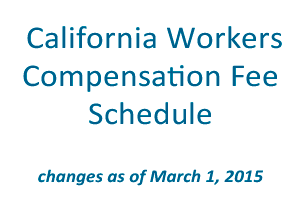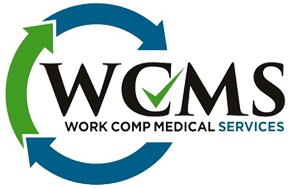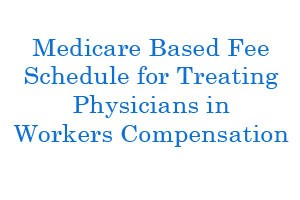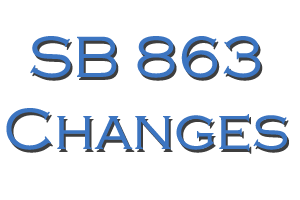Workers Compensation Fee Schedule as of 3/1/15
 As of March 1, 2015 fees for certain workers compensation services have increased along with Medicare fee changes. Below is a chart which shows some common codes and the 2014 fees vs. the 3/1/15 fees for California Workers Compensation. Record review is still a bundled code and still not payable without a 5307.1 contract. Reports are generally still not payable unless it is a Permanent and Stationary Report or if the report is requested by a QME or by the Administrative Director of the DWC.
As of March 1, 2015 fees for certain workers compensation services have increased along with Medicare fee changes. Below is a chart which shows some common codes and the 2014 fees vs. the 3/1/15 fees for California Workers Compensation. Record review is still a bundled code and still not payable without a 5307.1 contract. Reports are generally still not payable unless it is a Permanent and Stationary Report or if the report is requested by a QME or by the Administrative Director of the DWC.
| CPT Code | Description | 2014 Fee | 3/1/15 Fee |
| PSYCH CODES | |||
| 90791 | Psychological Eval | 150.51 | 155.64 |
| 90792 | Psychiatric Eval | 162.26 | 174.82 |
| 90833 | Psychiatric therapy add on code with E&M | 74.27 | 78.05 |
| 90834 | 45 min psychotherapy | 96.06 | 100.28 |
| 90837 | 60 min psychotherapy | 143.83 | 150.49 |
| 90901 | Biofeedback | 47.77 | 47.78 |
| 96101 | Psych Testing | 90.66/hr | 94.87/ hr |
| 96118 | Neuropsych Testing by PhD | 113.37/hr | 118.29/hr |
| 96118 | Neuropsych Testing by tech | 98.31/hr | 103.77/hr |
| EVALUATION AND MANAGEMENT CODES | |||
| 99205 | Initial OV High complexity | 237.67 | 252.73 |
| 99204 | Initial OV | 191.11 | 201.77 |
| 99203 | Initial Ov | 125.39 | 133.40 |
| 99215 | Ov for established patient | 167.15 | 178.59 |
| 99214 | Ov for established patient | 125.14 | 132.93 |
| 99213 | Ov for established patient | 84.99 | 89.81 |
| 99354 | Extended Face to Face 1st hour | 114.35 | 120.98 |
| 99355 | Extended Face to Face each additional hour | 111.68 | 117.23 |
| REPORTS | |||
| WC002 | PR2 | 11.91 | 12.01 |
| WC003 | PR3 | 157.68 | 158.94 max |
| WC004 | PR4 | 181.48 | 182.93 |
Documentation of the level of service is key to getting paid appropriately. Many carriers are down coding 99205 to 99203 and even 99202 in some cases.
For Initial Office Visits the codes require all 3 components:
99201 – Presenting problems(s): Minor (Time typically 10 minutes)
- Problem focused history
- Problem focused examination
- Medical decision making that is straightforward
99202 – Presenting problem(s): Low to moderate severity (Time typically 20 minutes)
- Expanded problem focused history
- Expanded problem focused examination
- Medical decision making is straightforward
99203 – Presenting problem(s): Moderate severity (Time typically 30 minutes)
- Detailed history
- Detailed examination
- Medical decision making of low complexity
99204 – Presenting problem(s): Moderate to high severity (Time typically 45 minutes)
- Comprehensive history
- Comprehensive examination
- Medical decision making of moderate complexity
99205 – Presenting problem(s): Moderate to high severity (Time typically 60 minutes)
- Comprehensive history
- Comprehensive examination
- Medical decision making of high complexity
As we can see from above there are four levels of medical decision making.
- Straightforward
- Low complexity
- Moderate complexity
- High complexity
Most practitioners and lay people can spot a comprehensive history and examination. There are a few factors that go into medical decision making.
- Number of Diagnoses: minimal, limited, multiple or extensive
- Amount and or complexity of Data to be reviewed (record review): minimal, limited, moderate or extensive
- Risk of complications and or morbidity or mortality: minimal, low, moderate or high.
Two of the three above components must be met to qualify for a given level of complexity.
So if you have 3 Diagnoses and you review records for 2 hours one would think you have high complexity. The problem as I see it is that the terms used such as extensive and moderate or multiple are undefined.




Leave A Comment